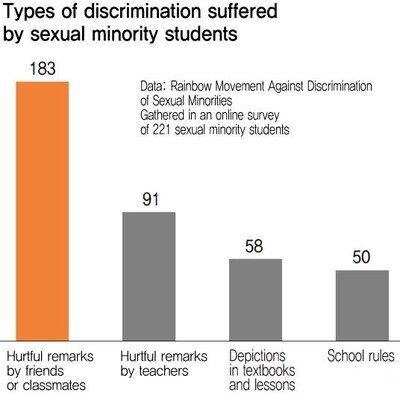hankyoreh
Links to other country sites 다른 나라 사이트 링크
[Special feature] Transgender students suffer discrimination in silence

By Park Soo-jin, Hankyoreh 21 reporter
Joon-hee, a student at an alternative school, is biologically female. She started menstruating when she was in junior high and her body has all the physical features of a woman. Nonetheless, she has never considered herself a woman. Even as an elementary school student, when she was unaware of her sexuality, Joon-hee was interested in a girl from her church. She hated that she was developing breasts, so she started wearing baggy clothes in 8th grade to hide her feminine body. She always cut her hair short. Most of her clothes and bags are either black or gray. Joon-hee is planning to get shots of testosterone in the near future so that she can grow more masculine. Joon-hee was born as a female but her sexual identity is closer to a male, making her a transgender.

In February 2012, Joon-hee registered at a girl’s high school. She became more concerned about her sexual identity after entering high school. She felt uneasy looking at herself in the mirror every morning in her school uniform’s gray skirt. In September, as her second semester started, she moved to the alternative school where she now studies. She expected the alternative school to be looser on sexual identity issues, as it did not require students to wear uniforms.
However, due to her masculine hairstyle and dress style, she was constantly asked, “Are you a boy or a girl?” by her teachers. This would not have happened in her previous school, where everyone is considered female. Joon-hee would answer in a crawling voice answer that she is a girl, because she hasn’t come out yet. She feels uncomfortable saying that she is a girl when she actually thinks of herself as a boy. But there are only two genders in Korean schools-male and female. This strict binary structure leaves no space for sexual minorities like transgenders. Joon-hee did not dare to come out with her sexual orientation to her friends, even in this small and friendly school where there are only 50 students. She overheard a conversation between two girls a few days ago during lunchtime.
“Hey, did you see XX and XY holding hands? Are they lesbians?”
“Ew, disgusting. We shouldn’t to talk to them from now on.”
Also, her junior classmates call her “Unni (a term of address from a younger girl to an older girl).” “Unni, let’s go eat,” or “Good morning, Unni.” Joon-hee decided to keep her sexual identity a secret because of this term.
Many of the teachers’ conversations are also uncomfortable for Joon-hee. Her Japanese teacher once said “Boys who have artistic talents should change their genders,” while her Korean teacher complained “I‘m so worried because my son likes pink. I think he could be gay.” Textbooks teach that love and marriage are possible only between member of opposite genders. While the books talk about policies towards women’s rights, they do not even mention the existence of sexual minorities. Transgenders and homosexuals are often stereotyped as ‘abnormal’ or ‘monsters.’
Sometime after, cyberspace communities for sexual minorities came to be a place where Joon-hee could talk freely. The first time she encountered the existence of sexual minorities was through a documentary on a lesbian couple when she was in elementary school. Although she was worried and wanted answers, she couldn’t find answers from people around her. So she had to rely on internet sources such as Wikipedia.”
According to a 2005 study by Chung-Ang University professor Lee Young-sik, 12.7% of junior high and high school students in Seoul show homosexual tendencies. Again, in a research done by Kim Kyung-joon, a researcher of Korea Institute for Youth Development, showed that 9.4% of the youths admitted that they are sexual minorities. However, online communities are the only places where these minorities, accounting almost 10% of the youth’s population, can have contact. This applied to Joon-hee as well: she met all of her seven transgender friends through the online community.
In 8th grade, Joon-hee told her Mom, “I think I like girls,” only to get a disappointing answer, “That’s because you’re young.” Her mom only recognized the seriousness of her daughter’s sexuality when she found a note from a transgender six years older than her with whom she had exchanged letters. Her mother prohibited Joon-hee from all internet activities after reading the affectionate letter professing her love for the older girl. Joon-hee’s mother declined to seriously discuss her daughter’s sexual identity or listen to her worries.
At a hair salon her mother even shouted out “Can’t you get a more girly hairstyle instead of that horrible short cut? When Joon-hee cut her hair short once again, her mother firmly said, Do you want to be a man? Are you planning to have a sex change operation? Don’t ever dream about it or you’ll be kicked out of the family.”
Joon-hee can’t bear her home or school, where she is forced to be a woman when she doesn’t consider herself as one. She has to call her older brother who has been discharged from the military ‘Oppa (a term a younger girl calls an older boy)’ instead of ‘Hyung (a term a younger boy calls an older boy).’ Before his discharge she used to call him ‘Private Kim’ or ‘Sergeant Kim,’ but now there are no other appellations for him. Joon-hee’s young brother calls her ‘nuna (a term a younger boy calls an older girl).’ Presently, the internet is the only safe haven for Joon-hee.
Measures for sexual minority youth

Around half of the sexual minority students surveyed stated that they have felt discrimination due to their different sexual identities. An online survey by ‘Rainbow Movement Against Discrimination of Sexual Minorities,’ got responses 221 sexual minority South Koreans under the age of 20. For the question ‘How intense was the discrimination based on sexual orientation?,’ 120 (54.3%) youths answered either ‘harsh’ or ‘very harsh.’ Only 8 students (3.6%) answered ‘there was no discrimination.’
When asked multiple choice questions about what kind of discrimination they suffered, ‘deprecatory or stereotyped remarks on sexual minorities by other students’ ranked first with 61.5% (136 cases), followed by ‘deprecatory or stereotyped remarks on sexual minorities by teachers’ with 39.8% (88 cases). ‘Outing’ a term used for unapproved exposure sexual orientation or identity by others, accounted for 29.4% (65 cases). 5.4% (12 cases) of the youths noted ‘sexual harassment, such as touching without consent.’
Moreover, sexual minority students answered that it was difficult to get help from school counselors. On the question ‘Are there any school advisers that specialize in helping sexual minority students’ only 83 students (37.6%) answered yes while 133 students (60.2%) answered no. When asked ‘Would you be willing to consult those advisors if they were available in your school?’, students who answered no (184 students, 83.3%) greatly outnumbered those who answered yes (28 students, 12.7%).
Experts argue that teachers must be educated on the human rights of sexual minorities, because large portion of discrimination is done by the teachers. Presently, human rights of sexual minorities are barely included in teachers’ training. Moreover, relevant topics are not compulsory. Kang Byung-chul, a professor at Sahmyook Nursing and Health College, stated, "There are many cases in which the teachers make jokes that may intensify stereotypes of sexual minorities, or in which teachers embarrass sexual minority students for their tendencies. Teachers must be educated on minorities’ human rights."
The school must provide programs to prevent any discrimination against sexual minority students. In the UK’s Safe Schools Program, schools have the legal duty to protect sexual minority students from being bullied and has the responsibility to act in such cases. Similarly, the Irish Education Act stipulates ‘the responsibility to counteract homophobic bullying and to respect the difference and diversity.’ In Finland, the Ministry of Education has developed and distributed a program aimed to homophobic bullying. Research showed that there is less bullying in countries that provide relevant laws and preventative programs.
Translated by Yoo Hey-rim, Hankyoreh English intern
Please direct questions or comments to [english@hani.co.kr]

Editorial・opinion
![[Column] Park Geun-hye déjà vu in Yoon Suk-yeol [Column] Park Geun-hye déjà vu in Yoon Suk-yeol](https://flexible.img.hani.co.kr/flexible/normal/500/300/imgdb/original/2024/0424/651713945113788.jpg) [Column] Park Geun-hye déjà vu in Yoon Suk-yeol
[Column] Park Geun-hye déjà vu in Yoon Suk-yeol![[Editorial] New weight of N. Korea’s nuclear threats makes dialogue all the more urgent [Editorial] New weight of N. Korea’s nuclear threats makes dialogue all the more urgent](https://flexible.img.hani.co.kr/flexible/normal/500/300/imgdb/original/2024/0424/7317139454662664.jpg) [Editorial] New weight of N. Korea’s nuclear threats makes dialogue all the more urgent
[Editorial] New weight of N. Korea’s nuclear threats makes dialogue all the more urgent- [Guest essay] The real reason Korea’s new right wants to dub Rhee a founding father
- [Column] ‘Choson’: Is it time we start referring to N. Korea in its own terms?
- [Editorial] Japan’s rewriting of history with Korea has gone too far
- [Column] The president’s questionable capacity for dialogue
- [Column] Are chaebol firms just pizza pies for families to divvy up as they please?
- [Column] Has Korea, too, crossed the Rubicon on China?
- [Correspondent’s column] In Japan’s alliance with US, echoes of its past alliances with UK
- [Editorial] Does Yoon think the Korean public is wrong?
Most viewed articles
- 1[Column] Park Geun-hye déjà vu in Yoon Suk-yeol
- 2Will NewJeans end up collateral damage in internal feud at K-pop juggernaut Hybe?
- 3N. Korean hackers breached 10 defense contractors in South for months, police say
- 4Why Korea shouldn’t welcome Japan’s newly beefed up defense cooperation with US
- 5[Guest essay] The real reason Korea’s new right wants to dub Rhee a founding father
- 6Thursday to mark start of resignations by senior doctors amid standoff with government
- 7[Editorial] New weight of N. Korea’s nuclear threats makes dialogue all the more urgent
- 8The dream K-drama boyfriend stealing hearts and screens in Japan
- 9Kim Jong-un expressed ‘satisfaction’ with nuclear counterstrike drill directed at South
- 10Terry Anderson, AP reporter who informed world of massacre in Gwangju, dies at 76